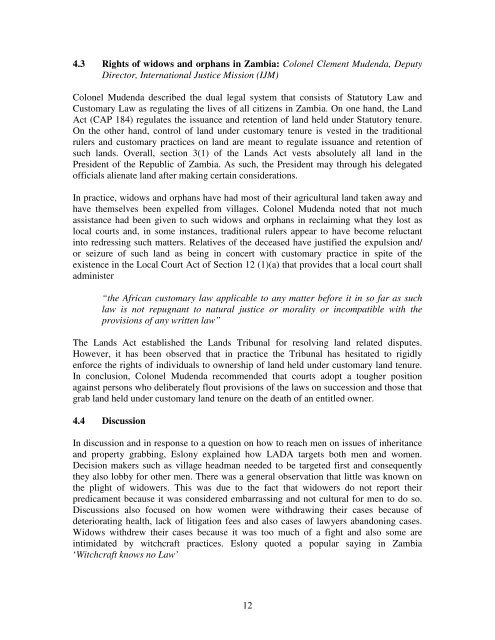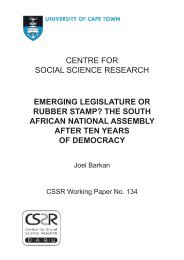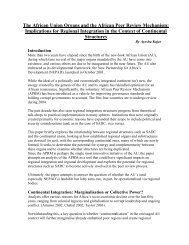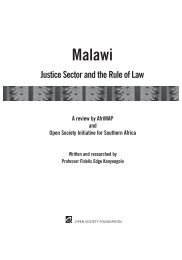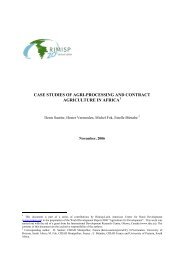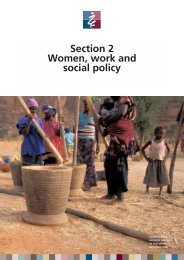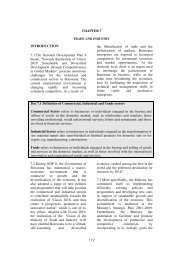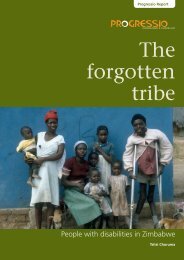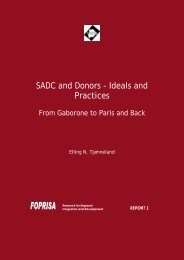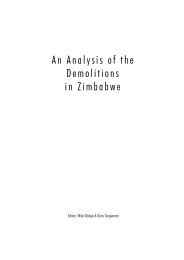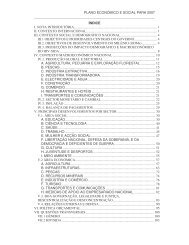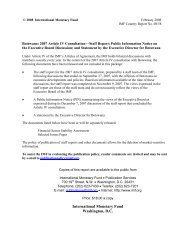Report of the National Conference: Women's Property Rights ... - FAO
Report of the National Conference: Women's Property Rights ... - FAO
Report of the National Conference: Women's Property Rights ... - FAO
Create successful ePaper yourself
Turn your PDF publications into a flip-book with our unique Google optimized e-Paper software.
4.3 <strong>Rights</strong> <strong>of</strong> widows and orphans in Zambia: Colonel Clement Mudenda, DeputyDirector, International Justice Mission (IJM)Colonel Mudenda described <strong>the</strong> dual legal system that consists <strong>of</strong> Statutory Law andCustomary Law as regulating <strong>the</strong> lives <strong>of</strong> all citizens in Zambia. On one hand, <strong>the</strong> LandAct (CAP 184) regulates <strong>the</strong> issuance and retention <strong>of</strong> land held under Statutory tenure.On <strong>the</strong> o<strong>the</strong>r hand, control <strong>of</strong> land under customary tenure is vested in <strong>the</strong> traditionalrulers and customary practices on land are meant to regulate issuance and retention <strong>of</strong>such lands. Overall, section 3(1) <strong>of</strong> <strong>the</strong> Lands Act vests absolutely all land in <strong>the</strong>President <strong>of</strong> <strong>the</strong> Republic <strong>of</strong> Zambia. As such, <strong>the</strong> President may through his delegated<strong>of</strong>ficials alienate land after making certain considerations.In practice, widows and orphans have had most <strong>of</strong> <strong>the</strong>ir agricultural land taken away andhave <strong>the</strong>mselves been expelled from villages. Colonel Mudenda noted that not muchassistance had been given to such widows and orphans in reclaiming what <strong>the</strong>y lost aslocal courts and, in some instances, traditional rulers appear to have become reluctantinto redressing such matters. Relatives <strong>of</strong> <strong>the</strong> deceased have justified <strong>the</strong> expulsion and/or seizure <strong>of</strong> such land as being in concert with customary practice in spite <strong>of</strong> <strong>the</strong>existence in <strong>the</strong> Local Court Act <strong>of</strong> Section 12 (1)(a) that provides that a local court shalladminister“<strong>the</strong> African customary law applicable to any matter before it in so far as suchlaw is not repugnant to natural justice or morality or incompatible with <strong>the</strong>provisions <strong>of</strong> any written law”The Lands Act established <strong>the</strong> Lands Tribunal for resolving land related disputes.However, it has been observed that in practice <strong>the</strong> Tribunal has hesitated to rigidlyenforce <strong>the</strong> rights <strong>of</strong> individuals to ownership <strong>of</strong> land held under customary land tenure.In conclusion, Colonel Mudenda recommended that courts adopt a tougher positionagainst persons who deliberately flout provisions <strong>of</strong> <strong>the</strong> laws on succession and those thatgrab land held under customary land tenure on <strong>the</strong> death <strong>of</strong> an entitled owner.4.4 DiscussionIn discussion and in response to a question on how to reach men on issues <strong>of</strong> inheritanceand property grabbing, Eslony explained how LADA targets both men and women.Decision makers such as village headman needed to be targeted first and consequently<strong>the</strong>y also lobby for o<strong>the</strong>r men. There was a general observation that little was known on<strong>the</strong> plight <strong>of</strong> widowers. This was due to <strong>the</strong> fact that widowers do not report <strong>the</strong>irpredicament because it was considered embarrassing and not cultural for men to do so.Discussions also focused on how women were withdrawing <strong>the</strong>ir cases because <strong>of</strong>deteriorating health, lack <strong>of</strong> litigation fees and also cases <strong>of</strong> lawyers abandoning cases.Widows withdrew <strong>the</strong>ir cases because it was too much <strong>of</strong> a fight and also some areintimidated by witchcraft practices. Eslony quoted a popular saying in Zambia‘Witchcraft knows no Law’12


